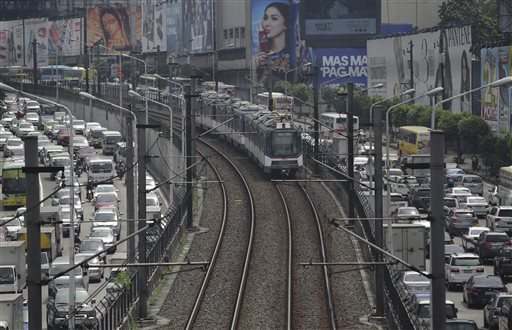Gov’t touts P940B mass transit plan
At least $20.91 billion (P940 billion) worth of mass transit projects are either being planned or under implementation in Metro Manila as part of long-term efforts to ease congestion and bolster economic growth beyond the term of President Aquino, the government said on Wednesday.
Briefing materials presented during Wednesday’s Philippine Economic Briefing showed that the projects include nine new railway lines, mainly in Metro Manila. These include the Light Rail Transit Line 1 Cavite extension, the LRT-6 Dasmariñas Line, Metro Rail Transit Line 7 or Commonwealth Line, LRT-2 east and west extension and the LRT-4 Taytay Line.
The largest of the mass transit projects is the P171-billion North-South Railway project, which includes a line from Manila to Legazpi, Albay. Also planned are bus rapid transit systems (C-5 and Manila) in the metropolis, capacity expansion projects of MRT-3 and a Manila Bay-Pasig ferry.
The presentation by the Department of Transportation and Communications (DOTC) showed that the mass transit budget also covered three additional terminals and 140 additional passenger stations. These, it said, would increase mass transport ridership from the current 1.2 million per day to 2.2 million by 2016.
The DOTC said boosting services would also help lower logistics costs.
Apart from mass transport, the department had laid out plans to overhaul the airport system. This will entail another $2 billion, with about $882.7 million going to key gateways like Manila’s Ninoy Aquino International Airport, Clark International Airport, Mactan Cebu International Airport and Davao International Airport.
The projects mentioned will be partly supported by the private sector via the government’s public-private partnership program.
Congestion in Metro Manila carries a significant economic cost, according to an earlier report by the Japan International Cooperation Agency, or Jica.
Jica, in its study, noted that the economic impact of traffic in Metro Manila costs about P2.4 billion a day at present. That figure would balloon to P6 billion per day by 2030 if the government would fail to intervene, it said.

